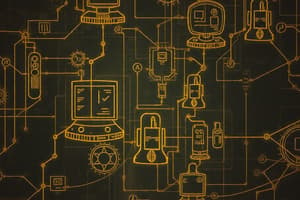Podcast
Questions and Answers
What is a computer?
What is a computer?
An electronic device that manipulates information or data.
Which generation of computers is based on microprocessors?
Which generation of computers is based on microprocessors?
- 1st Generation
- 2nd Generation
- 4th Generation (correct)
- 3rd Generation
What type of computers are most powerful and usually used in big organizations?
What type of computers are most powerful and usually used in big organizations?
- Microcomputers
- Handheld Computers
- Supercomputers (correct)
- Mainframes
Software can be touched.
Software can be touched.
What is the purpose of Python's comment symbol (#)?
What is the purpose of Python's comment symbol (#)?
Which statement about variables in Python is incorrect?
Which statement about variables in Python is incorrect?
Match the following programming concepts with their definitions:
Match the following programming concepts with their definitions:
What is the result of the arithmetic operation $2 ** 5$?
What is the result of the arithmetic operation $2 ** 5$?
Which operator is used for floor division in Python?
Which operator is used for floor division in Python?
The identity operator 'is' checks if two variables are NOT the same object.
The identity operator 'is' checks if two variables are NOT the same object.
What will be the output of the command print('Hello' + 'World')?
What will be the output of the command print('Hello' + 'World')?
Flashcards are hidden until you start studying
Study Notes
Computers Overview
- Computers are electronic devices used to manipulate, store, retrieve, and process data.
Generations of Computers
- 1st Generation (1940-1950): Utilized vacuum tubes for electronic flow control; applications included switches and amplifiers.
- 2nd Generation (1950-1960): Relied on transistors, improving efficiency as amplifiers and switches.
- 3rd Generation (1960-1970): Featured integrated circuits composed of silicon chips housing multiple electronic components.
- 4th Generation (1970-Present): Introduced microprocessors, integrating all necessary circuits for various operations on a single chip.
- 5th Generation (Present-Future): Focuses on artificial intelligence, aiming to create intelligent machines.
Types of Computers
- Supercomputers: Most powerful, typically employed by large organizations.
- Mainframes: Less powerful than supercomputers, support multi-tasking and high data storage.
- Mid-range Computers: Suitable for medium-sized companies.
- Microcomputers: Common modern devices including desktops, notebooks, and laptops.
- Handheld Computers: The smallest form factor for personal computing.
Hardware vs. Software
- Hardware: Physical components of a computer; tangible; can be replaced if damaged.
- Software: Intangible, non-physical instructions written in programming languages; can be reinstalled if corrupted.
Key Computer Concepts
- Input: Data or information that is entered into the computer.
- Output: Information that is displayed as a result of processing.
- Memory: Devices used for data storage.
Computer Software Categories
- System Software: Includes Operating Systems (OS), device drivers, and utilities.
- Application Software: Programs used by end-users for specific tasks.
Python Programming Language
- Popularity: Developed by Guido van Rossum in 1991; compatible with multiple operating systems.
- Syntax: Readable, uses fewer lines of code than other languages like Java.
- Comments: Use
#for code explanations; ignored by the interpreter. - Variables: Containers for data, can start with letters or underscores but not numbers; case-sensitive and cannot use reserved words.
Naming Conventions in Python
- Camel Case: myVarName
- Pascal Case: MyVarName
- Snake Case: my_var_name
Data Types and Casting
- Type Casting: Specify data types like
int,str,float. - Common Data Types:
- Integer (
int): Whole numbers. - Float: Numbers with decimals.
- String (
str): Collection of characters.
- Integer (
User Input and Output
- User Input: Obtained using
input(). - Output Display: Use
print(), can concatenate variables using,or+. - Type Verification: Use
type()to check an object's data type.
Arithmetic Operators
+: Addition-: Subtraction*: Multiplication/: Division%: Modulus (remainder)**: Exponentiation//: Floor division
Assignment Operators
=: Basic assignment+=: Addition assignment-=: Subtraction assignment*=: Multiplication assignment/=: Division assignment%=: Modulus assignment**=: Exponentiation assignment//=: Floor division assignment
Comparison Operators
==: Equal!=: Not equal>: Greater than<: Less than>=: Greater than or equal to<=: Less than or equal to
Logical Operators
and: True only if both statements are true.or: True if at least one statement is true.not: Reverses the truth value.
Identity Operators
is: True if both variables refer to the same object.is not: True if variables do not refer to the same object.
Membership Operators
in: True if a value exists in a sequence.not in: True if a value does not exist in a sequence.
Studying That Suits You
Use AI to generate personalized quizzes and flashcards to suit your learning preferences.




